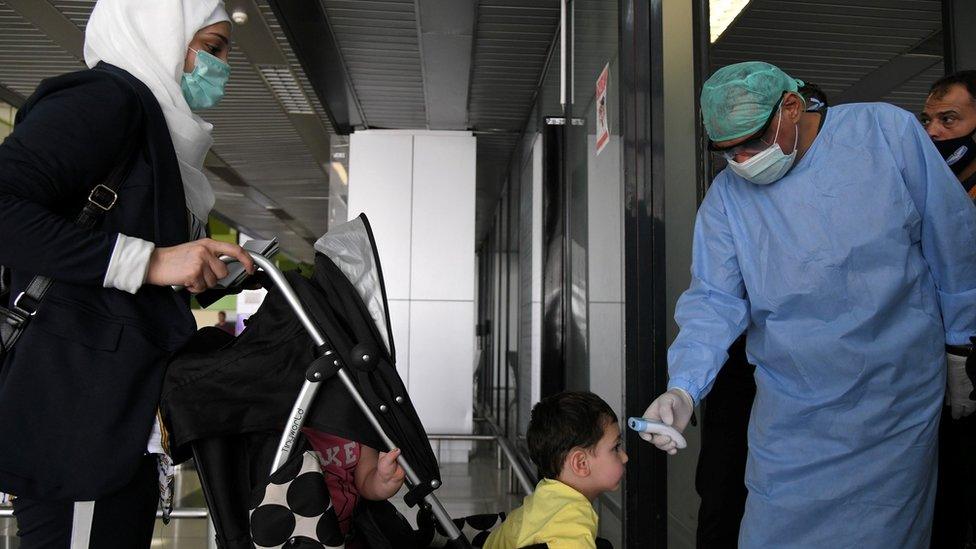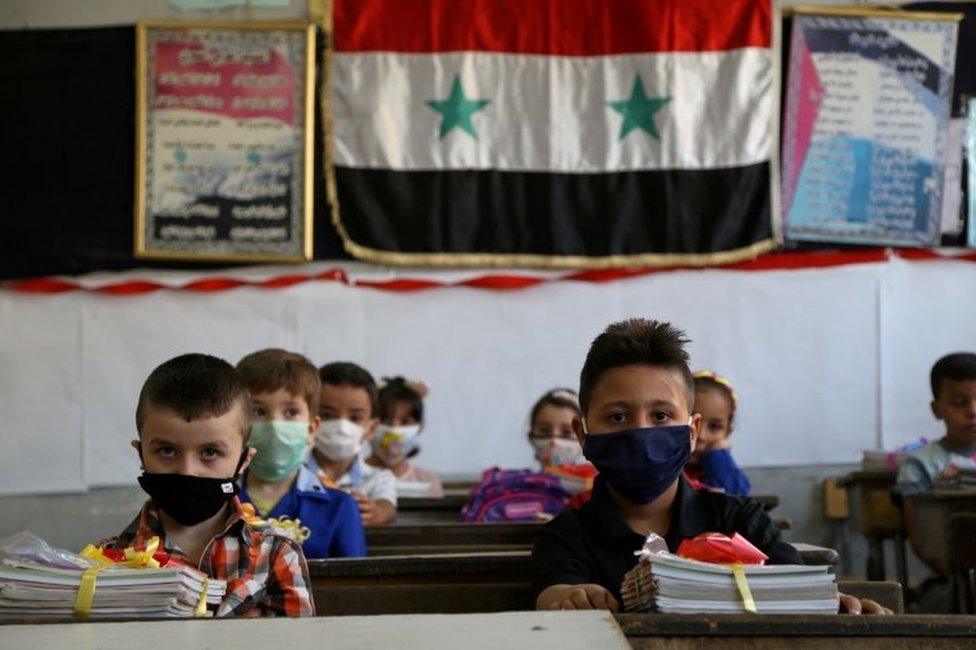Coronavirus: Syria government 'prepares for virus second wave'
- Published

Experts say limited testing capacity has hidden the scale of the crisis in Syria
The Syrian government has set up a temporary hospital for Covid-19 patients at a Damascus sports complex in preparation for what an official said was a possible second wave.
The facility at Al-Faiha Stadium will operate 120 beds for people requiring oxygen, but has capacity for 100 more.
The health ministry has reported 4,774 cases of Covid-19 and 228 deaths in government-held areas since March.
However, experts believe the actual figures are significantly higher.
Last month, researchers in the UK estimated that only a fraction of deaths due to Covid-19 in Damascus had been reported for various reasons, including limited testing capacity.
The UN warned that community transmission was widespread, external, as almost 90% of new cases could not be traced to a known source; infection rates among health workers were rising; and shortages of staff and supplies were putting even more pressure on a health system decimated by years of civil war.
Health authorities in the opposition-held north-west of Syria and the Kurdish-controlled north-east have separately reported the deaths of another 77 people with Covid-19 since the start of the pandemic.
What is the latest from Damascus?
So far this month, the Syrian government has reported 527 new Covid-19 cases and 26 deaths across its territory, according to the health ministry's website, external. In September, 1,417 infections and 86 deaths were recorded in total.
The state-run Sana news agency cited a senior health ministry official, Dr Tawfiq Hasaba, as saying the new temporary hospital at Al-Faiha Stadium was part of the measures being taken to "provide appropriate services to coronavirus patients in the event of a new climax", external.
Dr Hasaba said there had been an increase in the daily number of new cases in the past week, and noted that there could be a surge in cases this winter.
Sana reported that the ministry had also set up an emergency management room to co-ordinate the transportation and treatment of patients in government and private hospitals.
The government is not currently expected to reimpose the lockdown measures it eased in May because Syria is facing a deep economic crisis.
Why are the official figures being questioned?
Despite the dire humanitarian situation in Syria, far fewer cases and deaths have been reported there than in neighbouring countries.
The World Health Organization (WHO) has said that limited testing capacity has hidden the scale of the crisis.
"A lot of cases are still going unreported, and the actual number of Covid-19 cases is much higher," the WHO's Syria representative, Akjemal Magtymova, told Reuters news agency last week, external.

Schools reopened in Syria last month, ending a six-month coronavirus-related closure
A senior official at a Western non-governmental organisation was also quoted as saying there had been a "major and unprecedented spike in July and most of August" in Syria, during which 120 people were dying each day on average.
That figure tallied with the number of burials that took place at the Najha cemetery, the designated site for Covid-19 victims in Damascus, Reuters said.
Researchers at Imperial College London recently estimated that only 1.25% of deaths due to Covid-19 had been reported in Damascus, external, and that 4,380 deaths in total in the capital might have been missed as of 2 September.
Given that Damascus was likely to have the most robust surveillance in Syria, the findings suggested that other regions could have experienced similar or worse mortality rates, the researchers said.
The health ministry has not commented on the discrepancies.
Front-line health workers have also accused the government of failing to protect them.
Doctors, nurses and aid workers have told Human Rights Watch that they face shortages of personal protective equipment (PPE) and restricted access to oxygen tanks, external, while in mid-August the doctors union reported that a total of 61 health workers had died since Covid-19 was first detected, external in Syria.
- Published5 July 2022
